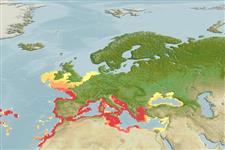Environment: milieu / climate zone / depth range / distribution range
Ecology
Marine; demersal; non-migratory; depth range ? - 800 m (Ref. 4570). Temperate; 55°N - 25°N, 32°W - 42°E
Eastern Atlantic: British Isles to the Azores, and the Canary Islands, including Morocco, the Mediterranean Sea and the Black Sea.
Length at first maturity / Size / Weight / Age
Maturity: Lm 14.4, range 10 - ? cm
Max length : 40.5 cm TL male/unsexed; (Ref. 33903); common length : 15.0 cm TL male/unsexed; (Ref. 3397); max. published weight: 870.00 g (Ref. 40637)
Dorsal spines (total): 12; Dorsal soft rays (total): 7 - 9; Anal spines: 3; Anal soft rays: 4 - 6. This species is distinguished by the following characters: D XII,7-9 with the last divided at base; pectoral fin rays 16-18, uppermost branched pectoral fin ray is usually the third (rarely second to fourth); lacrimal usually with 2 spines over maxilla that point at nearly right angle from each other, posterior pointing ventrally and slightly anteriorly; occipital pit is well-developed; anteriormost mandibular lateral line pores are widely separated; scales small, emarginate, no distinct ctenii; scale rows in longitudinal series 56-60; no scales on chest and pectoral fin base; cirri well developed over entire head and body, no cirri on lower jaw (Ref. 122805).
Solitary and sedentary. Common among rocks and algae. Feeds on small fishes (gobies, blennies), crustaceans and other invertebrates (Ref. 4570).
Life cycle and mating behavior
Maturities | Reproduction | Spawnings | Egg(s) | Fecundities | Larvae
Fricke, R., D. Golani, B. Applebaum-Golani and U. Zajonz, 2018. Scorpaena decemradiata new species (Teleostei: Scorpaenidae) from the Gulf of Aqaba, northern Red Sea, a species distinct from Scorpaena porcus. Scientia Marina 82(3):1-16. (Ref. 122805)
IUCN Red List Status (Ref. 130435)
Threat to humans
Traumatogenic (Ref. 4690)
Human uses
Fisheries: minor commercial; aquarium: commercial
Tools
Special reports
Download XML
Internet sources
Estimates based on models
Preferred temperature (Ref.
123201): 11.2 - 15.8, mean 13.9 °C (based on 232 cells).
Phylogenetic diversity index (Ref.
82804): PD
50 = 0.5000 [Uniqueness, from 0.5 = low to 2.0 = high].
Bayesian length-weight: a=0.01318 (0.01172 - 0.01483), b=3.03 (3.00 - 3.06), in cm total length, based on LWR estimates for this species (Ref.
93245).
Trophic level (Ref.
69278): 3.9 ±0.2 se; based on diet studies.
Generation time: 6.4 (6.0 - 10.3) years. Estimated as median ln(3)/K based on 10
growth studies.
Resilience (Ref.
120179): Medium, minimum population doubling time 1.4 - 4.4 years (K=0.2-0.5; tmax=8).
Fishing Vulnerability (Ref.
59153): Moderate to high vulnerability (47 of 100).
Climate Vulnerability (Ref.
125649): Moderate vulnerability (38 of 100).
Nutrients (Ref.
124155): Calcium = 34.5 [19.3, 77.6] mg/100g; Iron = 0.359 [0.197, 0.663] mg/100g; Protein = 18.1 [16.6, 19.6] %; Omega3 = 1.09 [0.49, 3.04] g/100g; Selenium = 19.6 [10.1, 44.7] μg/100g; VitaminA = 17.9 [5.5, 53.9] μg/100g; Zinc = 0.525 [0.377, 0.761] mg/100g (wet weight); based on
nutrient studies.
